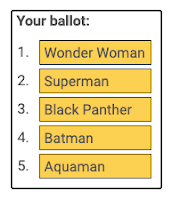You could imagine that a voter might want to give two candidates the same ranking. For example, using the ballot example here, a voter might want to rank both Wonder Woman and Superman first and rank Black Panther second.
Our user interface does not allow voters to specify equal rankings like this. We occasionally get asked to allow equal rankings in OpaVote, and in this blog post we explain why we won't do so. The fundamental reason is a simple cost-benefit tradeoff.
Benefits of Equal Rankings
The benefit of allowing equal rankings is that the voter has increased ability to express his or her preferences about the candidates.
If a voter truly thinks two candidates are equal, however, then there is no harm in forcing the voter to give the two candidates different rankings. If the voter is equally happy with two candidates, then it doesn't matter to him which is elected, and the order of the two candidates on the ballot doesn't matter.
Accordingly, allowing equal rankings does not give much benefit to the voter because it does not give the voter any increased ability in electing a candidate important to the voter.
Disadvantages of Equal Rankings
One disadvantage of allowing equal rankings is that it can make the user interface for the ballot more complicated. Here is an example OpaVote ballot:
Another disadvantage with equal rankings is that it makes the counting rules more complicated and harder for voters to understand. Suppose that a voter casts the following ballot:
- Wonder Woman; Superman
- Black Panther
Initially, I suppose Wonder Woman and Superman would each get half of a vote. But suppose that Superman is later eliminated. Would Superman's half vote get transferred to Wonder Woman or Black Panther? I suppose it makes more sense to transfer the half vote to Wonder Woman, but it makes the counting logic more complicated.
Equal Rankings in Practice
Where ranked-choice voting is used for real government elections (e.g., San Francisco), it is possible for a voter to give two or more candidates the same ranking. The equal ranking is called an "overvote" and it is treated as a voter error. When this happens, there are generally three different ways that that the equal ranking or overvote is handled:
- Void -- Any ballot with an equal ranking is void and does not count towards any candidate (even if there is a first choice for a single candidate).
- Stop -- The ballot is counted until an equal ranking is reached. When an equal ranking is reached, the ballot is treated as exhausted and all further rankings (even non-equal ones) are ignored. San Francisco does this.
- Skip -- Any equal rankings on the ballot are skipped and the next single ranking is counted. For the example ballot above, Black Panther would count as the first choice. Cambridge, Massachusetts does this.
In practice, all ranked-choice voting counting rules that I have seen treat an equal ranking as an error.
OpaVote is actually able to process BLT files that indicate equal rankings (see the BLT file format documentation), and will process them using "Skip" except for San Francisco and Oakland RCV which process them using "Stop".

